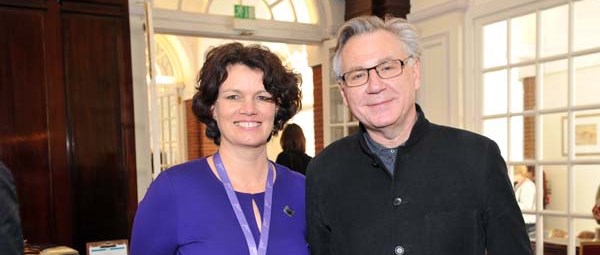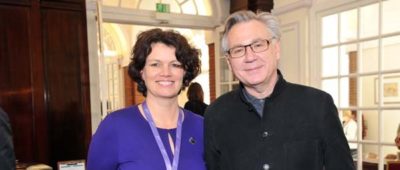



Annual Summit 2019 – Accelerating Success
Pancreatic Cancer UK Chief Executive Diana Jupp blogs about our Annual Summit 2019: Accelerating Success
Pancreatic Cancer UK Chief Executive Diana Jupp blogs about our Annual Summit 2019: Accelerating Success and how nothing demonstrates this better than new developments in care and research to enable us to better diagnose and treat pancreatic cancer.
Our sixth annual Summit took place last week and I for one ended the day feeling inspired and galvanised by the sheer energy and passion I witnessed through the pancreatic cancer community coming together in this unique way.
The theme of this year’s Summit was Accelerating Success, and nothing demonstrates this better than new developments in care and research to enable us to better diagnose and treat pancreatic cancer.
We had some very exciting updates from Professor Steve Pereira who emphasised that collaboration was critical to successful research into early diagnosis and provided insights into some promising biomarkers. He spoke of the need for studies to test these biomarkers to develop screening for those at high-risk of pancreatic cancer, and to allow a route for people who present to their GP with vague symptoms but do not fit the 2-week referral pathway.
Professor Andrew Biankin highlighted the need for new research models to improve treatment for pancreatic cancer with personalised medicine. He advocated that giving a patient the right treatment at the right time, the aim of PRECISION Panc, could be the key to longer survival.
Accurate staging also ensures people get the right treatment, and in particular can help ensure that people do not undergo a huge operation when the cancer has already spread. This is where PET-CT scans come in, which Professor Paula Ghaneh took us through in her session. PET-CT can improve the accuracy of diagnosis and staging for pancreatic cancer but there are challenges getting these established into routine care which we need to push to be overcome.
Similarly, in one of the breakout sessions, we looked at the barriers to pancreatic cancer patients accessing clinical trials. Medical teams don’t always have access to information on available clinical trials in Multi-Disciplinary Team meetings, potentially missing the opportunity to participate in clinical trials. One solution to this could be trial management software that could assign the right patient to the right trial. Also, by working with patients, the accessibility, sensitivity and complexity of trial information can be improved and trials made more appealing to prospective participants.
It was fantastic to hear from one of our Future Leaders at the Summit, Andres Garcia, a PhD student at UCL, who won our poster competition. He told us about how he has developed a new 3D modelling of nanoparticles to deliver drugs to the pancreas directly and more effectively. He has seen promising results showing that this model can selectively kill cancer cells. We hope to see this model taken to clinical trial soon.
In terms of looking at new avenues for treatment, Dr Ganesh Radhakrishna stressed the potential of precision radiotherapy and the need for research into new radiotherapy techniques and Proton Beam Therapy.
In the Optimising Treatment Pathway session it was highlighted that best practice to diagnose and treat pancreatic cancer faster and effectively, exists around the country and is feasible in the NHS. Examples were one-stop clinics, fast-track surgery, prehabilitation, enhanced recovery and adjuvant chemotherapy. However, resources and sustainable funding for additional Clinical Nurse Specialists are needed to support patients and help them navigate, while sufficient management staff to work on the logistics of the pathway and record progress is another challenge that needs to be addressed.
What struck me most from hearing about accelerating access to trials and treatment throughout the day was, even though best practice models of research and clinical practice exist in the UK, they are not consistently embedded into the NHS. We must look to our colleagues in the Netherlands, where collaboration and a multi-disciplinary approach has been critical. Dr Hanneke Wilmink, representing the Dutch Pancreatic Cancer Group which provides the infrastructure for collecting clinical data, patient reported outcomes and storing blood and tumour tissue, told us loud and clear that working in collaboration leads to a wider portfolio, wider reach and greater impact.
There is no doubt that bringing amazing experts together is critical to accelerating success, but of paramount importance in making progress, is ensuring we address the imbalance in patient experience and variations in care.
The day highlighted the huge differences encountered by people when being diagnosed with pancreatic cancer. Tom Hawthorne shared the speed of his diagnosis and treatment – 22 days from his GP visit to being in surgery. An example that faster treatment can happen and what we’ve been calling for as part of our Demand Faster Treatment campaign. His supportive and proactive GP made such a huge difference to his experience.
Frances Greenwood and her husband Gary had a very different experience of repeated delays and missed opportunities for diagnosing Gary’s pancreatic cancer and also communication problems between two hospitals.
Erika Vincent, who supported our Demand Faster Treatment campaign and who we paid tribute to at the Summit sadly died of pancreatic cancer in February. When she was diagnosed she was given just four months to live. So she expected that her cancer would be treated as an emergency, and that she’d be given treatment fast. But it didn’t happen.
We are determined to work with the pancreatic cancer community to reduce these variations, so that people get the best treatment and care wherever they live.
From the experiences shared at the summit and so many more, it is clear that patients must have a holistic needs assessment to find out what their support needs are and access to adequate psychological support if required following their diagnosis. Tom was told he would have to wait 12 weeks for counselling and we know this is time some people will not have. This support also needs to be tailored to individual needs and preferences. Gary preferred not to speak about his diagnosis. What is apparent is that the needs of patients and families have to be at the forefront of any pancreatic cancer services.
In our work, we sadly often hear that the supportive care needs of patients are not being met, and this was highlighted through the national patient survey we conducted last year, the topic of one of our breakout sessions. We will be sharing the results of this more widely imminently, and in light of the findings we will be calling for the Government and the NHS across the UK to develop a data-driven personalised care service for pancreatic cancer that offers holistic needs assessment straight after diagnosis.
Collaboration was definitely one of the resounding messages of the day. Encouragingly, working together and speeding up how innovations are adopted into routine practice aligns with the ambitions in the new long-term NHS plan, as stressed in the panel discussion expertly facilitated by broadcaster Nicholas Owen. However, as the expert panel noted, the plan doesn’t specifically mention pancreatic cancer or its speed and ferocity, so in order to avert the risk of the disease being left behind, we will continue to campaign for it to be treated differently to other cancers and to have specific targets, such as treatment within 20 days of diagnosis.
Overall, the day was a powerful demonstration of the many strands of activity helping accelerate progress, and this blog provides just a snapshot of the energy in the room. There is no doubt we have an incredibly committed and inspiring pancreatic cancer community, and I cannot wait to see how we will all have accelerated success before we meet this time next year.

